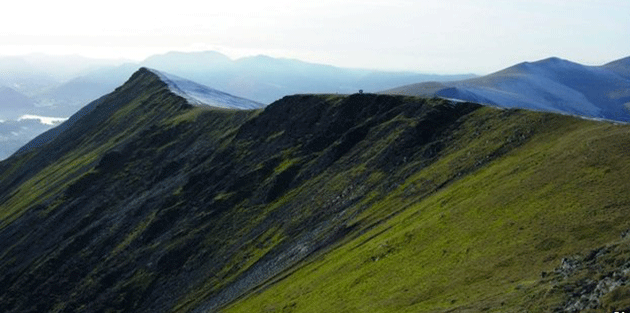Maybe You Can Get Blood from a Stone by Lawrence W. Reed
How a beautiful old hill in Britain is bleeding one man dry.
With these words two centuries ago, the poet Samuel Taylor Coleridge immortalized a beloved mountain in Britain’s stunningly beautiful Lake District:
On stern Blencathra’s perilous height
The winds are tyrannous and strong;
And flashing forth unsteady light
From stern Blencathra’s skiey height,
As loud the torrents throng!
The famed and prolific fellwalker (hill climber) and guide book author Alfred Wainwright (1907–1991) wrote more about Blencathra than any other hill or mountain in the country. Untold hundreds of thousands of hillwalkers have left their footprints on its trails. The goat herds of a dozen graziers eat of its grass every day. It’s quiet, panoramic, idyllic—and private.
Now the peak is in the news again, as I learned during a visit to Britain earlier this month. Blencathra is up for sale.
For 400 years, the nearly 3,000-foot Blencathra has belonged to the same family, the Lowthers. Ownership includes an ancient manorial title, the Lordship of the Manor of Threlkeld, and the man who holds it now is Hugh Lowther, Lord Lonsdale. Since his father died eight years ago, Lord Lonsdale has been saddled with a massive inheritance tax bill he can’t pay without selling the mountain. The British government wants £9 million—equivalent to more than $15 million.
A worldwide study by accountants UHY Hacker Young showed that Ireland and Britain (in that order) have the highest death duties of any of the world’s major economies—more than three times higher than the global average. Australia, Israel, and New Zealand are among the more enlightened developed countries that have scrapped the tax on death altogether. Even the average continental European tax on a large estate is less than half what it is in Britain.
“Big inheritance tax bills,” UHY Hacker Young’s Ladislav Hornan told The Telegraph, “can reduce the incentive to keep creating wealth in order to pass it on to your family. They can also deprive the next generation of capital that traditionally has been key to funding the establishment of new businesses. As more and more UK families are caught in the inheritance tax trap, pressure for major reform is growing.”
Prime Minister David Cameron promises to raise the threshold of estate value at which the high death rates kick in—hardly revolutionary and certainly a step that doesn’t challenge the inherent injustices of the inheritance tax: It taxes a second time what was already taxed heavily once (as income); it assaults the right of a property owner to bequeath his already-taxed wealth to his family; it makes it difficult if not impossible to pass on land that generates little income because its owners seek to preserve its pristine nature; and it siphons money from productive people to politicians to squander and buy votes.) See “Grave Robbers: The Moral Case Against the Death Tax” by Edward J. McCaffery (1999).
Lowther is asking 1.75 million pounds for Blencathra but at that price, any buyer will have to pay over 300,000 pounds more (half a million dollars) in VAT, or value-added tax. There’s no such thing as a free lunch or a cheap mountain in the British welfare state.
“Nobody climbs mountains for scientific reasons,” said Sir Edmund Hillary, who scaled the summit of Mt. Everest in Nepal. “Science is used to raise money for the expeditions, but you really climb for the hell of it.” Sometimes I think that’s the best explanation for why governments tax inheritances—just for the hell of it.
 ABOUT LAWRENCE W. REED
ABOUT LAWRENCE W. REED
Lawrence W. (“Larry”) Reed became president of FEE in 2008 after serving as chairman of its board of trustees in the 1990s and both writing and speaking for FEE since the late 1970s. Prior to becoming FEE’s president, he served for 20 years as president of the Mackinac Center for Public Policy in Midland, Michigan. He also taught economics full-time from 1977 to 1984 at Northwood University in Michigan and chaired its department of economics from 1982 to 1984.



Trackbacks & Pingbacks
[…] How a beautiful old hill in Britain is bleeding one man dry. With these words two centuries ago, the poet Samuel Taylor Coleridge immortalized a beloved mo […]
Comments are closed.